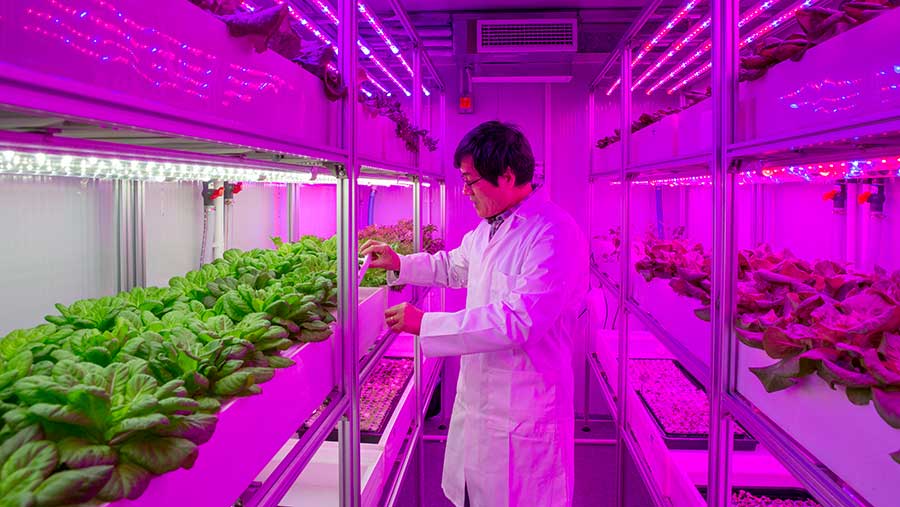University designs vertical farms to help self-sufficiency
 © NTU
© NTU University scientists are designing vertical farms to grow crops with less inputs and help improve the UK’s food self-sufficiency.
The solar-powered system, which grows vegetables, salads and fruit, stacked vertically and without soil, is being created at Nottingham Trent University (NTU).
See also: Opinion: Vertical farming is ‘pie in the sky’ for most crops
The two units – one about the size of a shipping container and the other about half the size – will act as an initial proof of concept and pave the way for more to be built and used by retailers, caterers, local authorities and schools.
Scientists say each “farm” is capable of producing 3-5t of fresh crops a year and will provide a reliable source for domestic produce.
Prototypes
“We are designing and engineering prototypes before carrying out a detailed feasibility study,” said Chungui Lu, professor of Sustainable Agriculture in NTU’s School of Animal, Rural and Environmental Sciences.
He added: “We urgently need to develop new methods to enable intensive and sustainable crop production.
“We need an innovative container farming system that can be manufactured at low cost, is easy to install, unaffected by climate and seasons and can produce high-yields with high-quality crops with a significant reduction in carbon footprint.
“It’s also important to reduce reliance on imports, particularly given the UK’s exit from the EU.”
How it works
Plant roots are suspended mid-air in high humidity and misted with a nutrient solution that increases nutrient use efficiency and plant growth, with a surplus of oxygen at the root surface.
Controlled conditions, including lighting and what nutrient mixes to apply, can be adjusted to suit the needs of specific crops.
“Using novel semi-mist culture methods, this will be an advanced, energy-efficient and carbon-neutral vertical farm for onsite use at retailers, schools and other organisations,” Prof Chungui Lu said.
“By the end of the project, we will have a new generation of containerised vertical farming that will improve UK resilience to environmental shocks and food security, and will be beneficial for both the farming industry and society.”
Government grant
NTU is working with agriculture engineering company Henley Associates and the project has been funded by an £800,000 grant from Innovate UK.
The university has already built two container farms at its Brackenhurst Campus which are used for research and teaching about precision agriculture.
Charles Brunton, director and project manager at Henley Associates, said: “Food production has forever relied upon favourable weather and suitable soil.
“Vertical farming negates both of these factors – especially weather – as global warming takes effect worldwide, as has been witnessed in the UK over the past few years, resulting in failed crops, resown crops and reduction in yields.”
In August, Scotland’s Rural College announced it was building a £500,000 vertical farm at its King’s Buildings campus in Edinburgh, to research plant and crop science and be used by students.
Part of the research will be to compare different production systems and their inputs by analysing crop yield and growth rates.
